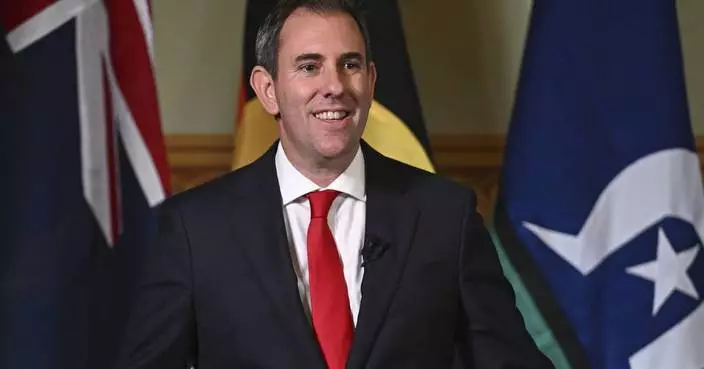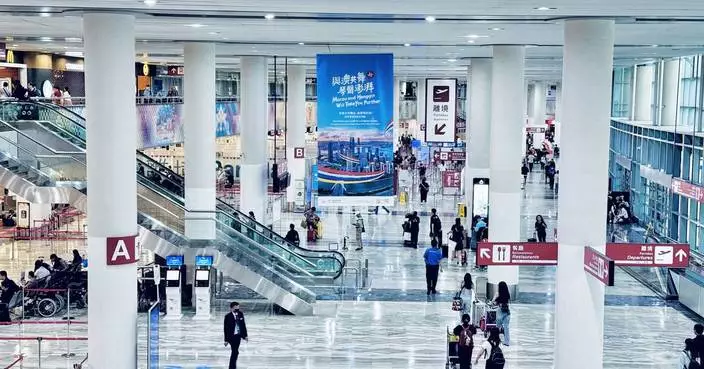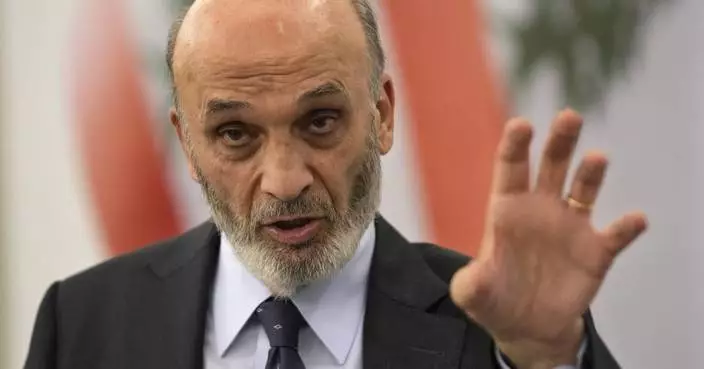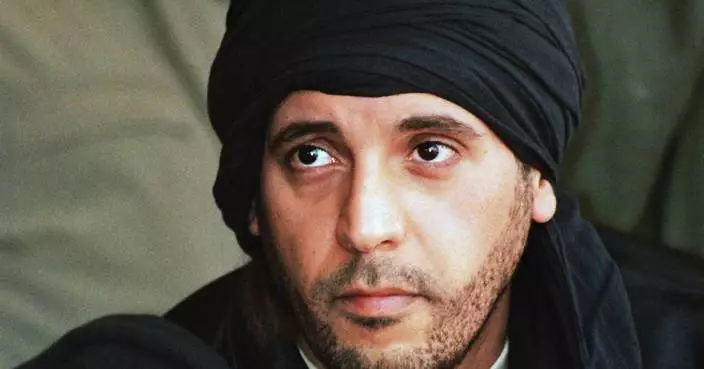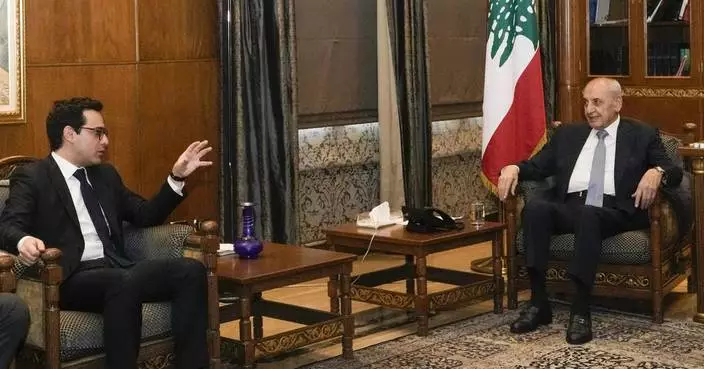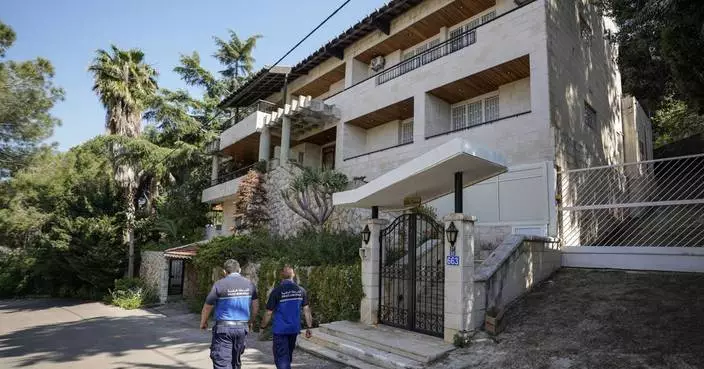Diplomats were meeting behind closed doors in Paris on Wednesday to consider measures to help Lebanon as it grapples with ongoing political turmoil and its worst economic crisis in decades.
The international group, co-chaired by France and the United Nations, is weighing conditions for providing financial aid to Lebanon. Lebanese businesses and households are growing increasingly desperate as cash supplies there have dwindled.
For two months, protests have decried government mismanagement and the current political system. But even as the financial crisis deepens, protesters have denounced the Paris meeting and promised to condemn any international financial assistance to a government they see as corrupt and illegitimate.
Prime Minister Saad Hariri resigned Oct. 29, but he has stayed on as caretaker prime minister since politicians have been unable to form a new government. Protesters want to see a non-sectarian, technocratic government — and they want all traces of the old regime, including Hariri, out of office.
France and the U.S. have made clear they support a new government in Lebanon.
Speaking in Washington on Wednesday, U.S. Secretary of State Mike Pompeo told reporters that “the responsibility lies with the Lebanese people” to push for a new political order. He said the U.S. is ready to “do the things that the world can do to assist the Lebanese people getting their economy right and getting their government right.”
The U.S. has escalated its sanctions on the Iran-backed Lebanese Hezbollah group, which dominates the national unity government that Hariri headed.
French Foreign Minister Jean-Yves Le Drian said at a press conference ahead of the Paris meeting that Lebanese authorities must “take into account the call of the street.” He urged Lebanese authorities to “form a government rapidly because any delay will aggravate the situation.”
Meanwhile, dozens of protesters in Beirut and Paris rallied Wednesday to call on the leaders meeting in France not to give financial assistance until a new government comes together.
“This authority ... no longer represents the Lebanese,” said a protester in Beirut reading a letter to be delivered to the French ambassador. Calling the current government corrupt, the protester said: “We don’t want (that aid) to go to waste.”
Hariri has called on Saudi Arabia, France, Turkey, the United States, China, and Egypt to send funds to help Lebanon finance imports.
But international donors are unlikely to write a check without substantial commitments to reform. More than 50 countries pledged last year to give Lebanon $11 million in aid, conditioned on Hariri implementing long-stalled reforms. Promised reforms never materialized.
Associated Press writer Matt Lee contributed to this report from Washington
BEIRUT (AP) — The European Union announced on Thursday an aid package for Lebanon of 1 billion euros — about $1.06 billion — much of which will go to strengthening border control to halt the flow of asylum seekers and migrants from the small, crisis-wracked country across the Mediterranean Sea to Cyprus and Italy.
The deal follows other recent deals by the EU to provide funds to countries such as Egypt, Tunisia and Mauritania to fortify their borders. It comes against a backdrop of increasing hostility toward Syrian refugees in Lebanon and a major surge in irregular migration of Syrian refugees from Lebanon to Cyprus.
European Union Commission President Ursula von der Leyen announced the aid, which will be distributed between this year and 2027, during a visit to Beirut alongside Cypriot President Nikos Christodoulides.
The bulk of the package — 736 million euros — would go to supporting Syrian refugees “and other vulnerable groups” in Lebanon, while 200 million euros would bolster Lebanese security services in enforcing border and migration control, according to figures provided by the Cypriot government.
An unspecified amount of the aid would go to Lebanese fishermen, to discourage them from selling their boats to be used by smugglers.
Von der Leyen said the EU will also be “exploring how to work on a more structured approach to voluntary return to Syria in close cooperation with” the U.N. refugee agency, or UNHCR, and called for more international support for humanitarian and early recovery projects in Syria.
Europe will also continue to maintain “legal pathways” for resettlement of refugees in Europe, she said.
Lebanon's Caretaker Prime Minister Najib Mikati praised the aid package, saying that "Lebanon’s security is security for European countries and vice versa.”
“Any blowup related to the issue of displaced persons will not be limited to Lebanon but will extend to Europe to become a regional and international crisis,” he said.
Lebanon, which has been in the throes of a severe financial crisis since 2019, hosts nearly 785,000 registered Syrian refugees and hundreds of thousands more who are unregistered, the highest population of refugees per capita in the world.
Lebanese political officials have been calling for years for the international community to either resettle the refugees in other countries or assist in returning them to Syria — voluntarily or not. Lebanese security forces have stepped up deportations of Syrians over the past year.
Tensions around the presence of refugees have further flared since an official with the Christian nationalist Lebanese Forces party, Pascal Suleiman, was killed last month in what military officials said was a botched carjacking by a Syrian gang. The incident prompted outbreaks of anti-Syrian violence by vigilante groups.
Meanwhile, Cypriot authorities have been complaining that their country has been overwhelmed by a wave of irregular migration of Syrian asylum seekers, many of them coming on boats from Lebanon.
The Lebanon office of the UNHCR said it had verified 59 “actual or attempted” departures by boats carrying a total of 3,191 passengers from Lebanon between January and mid-April, compared to three documented boat movements carrying 54 passengers in the same period last year.
Usually, few boats attempt the crossing in the winter, when the passage becomes more dangerous. In total, UNHCR recorded 65 boat departures carrying 3,927 passengers in all of 2023.
Cyprus has taken increasingly aggressive tactics to halt the flow of migrants. Last month, it suspended processing of Syrian asylum applications, and human rights groups accused the Cypriot coast guard of forcibly pushing back five boats carrying about 500 asylum seekers coming from Lebanon. Cypriot officials have denied this.
Christodoulides hailed Thursday's visit as a “historic day” and praised the EU decision, calling for European officials to go farther and declare some areas of Syria safe for return.
“The current situation is not sustainable for Lebanon. It is not sustainable for Cyprus, it is not sustainable for the European Union,” he said.
The new funding announcement comes ahead of the annual fundraising conference for the Syrian crisis in Brussels later this month. After 13 years of civil war in Syria, donor fatigue has set in while the world’s attention is occupied by the humanitarian fallout of more recent conflicts in Ukraine and Gaza.
Associated Press writer Menelaos Hadjicostis in Nicosia, Cyprus, contributed to this report.
Follow AP’s global migration coverage at: https://apnews.com/hub/migration

Lebanese caretaker Prime Minister Najib Mikati, center, speaks during his meeting with Cyprus' President Nikos Christodoulides, left, and President of the European Commission Ursula von der Leyen at the government palace in Beirut, Lebanon, Thursday, May 2, 2024. (AP Photo/Hassan Ammar)
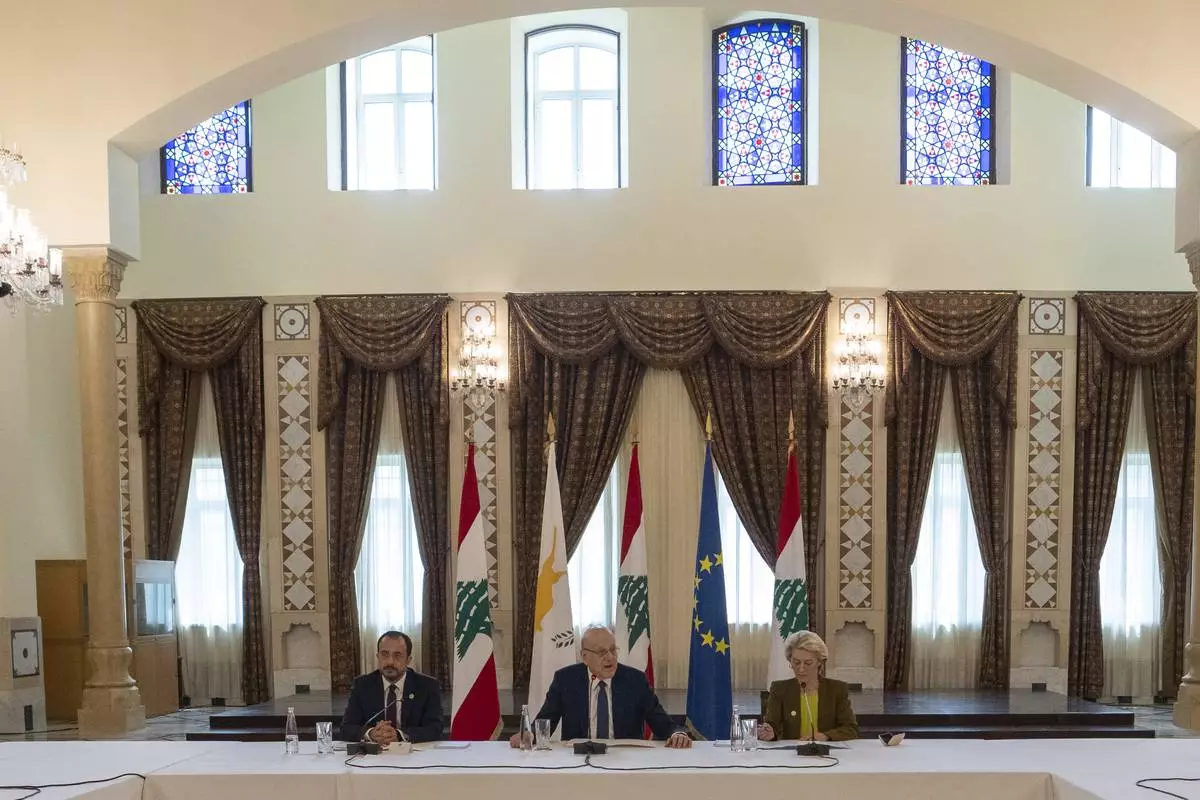
Lebanese caretaker Prime Minister Najib Mikati, center, speaks during his meeting with Cyprus' President Nikos Christodoulides, left, and President of the European Commission Ursula von der Leyen at the government palace in Beirut, Lebanon, Thursday, May 2, 2024. (AP Photo/Hassan Ammar)
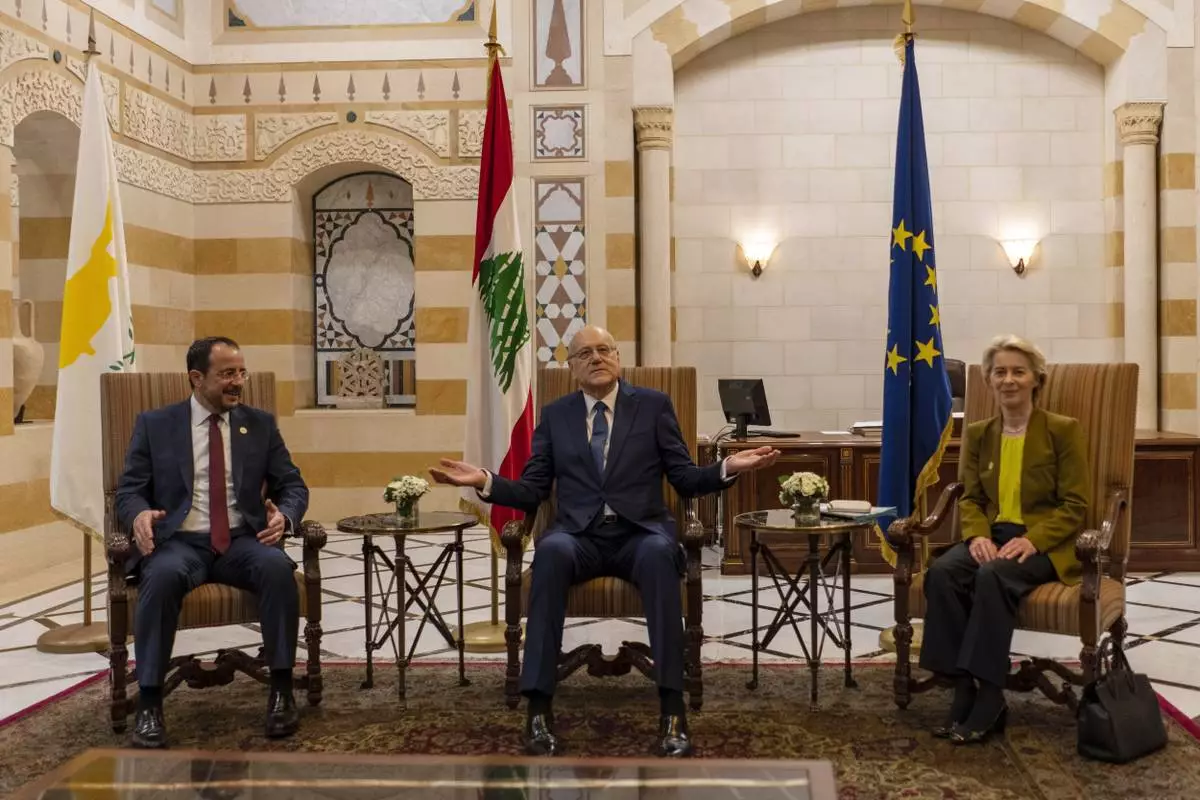
Lebanese caretaker Prime Minister Najib Mikati, center, welcomes Cyprus' president Nikos Christodoulides, left, and President of the European Commission Ursula von der Leyen before their meeting at the government palace in Beirut, Lebanon, Thursday, May 2, 2024. (AP Photo/Hassan Ammar)
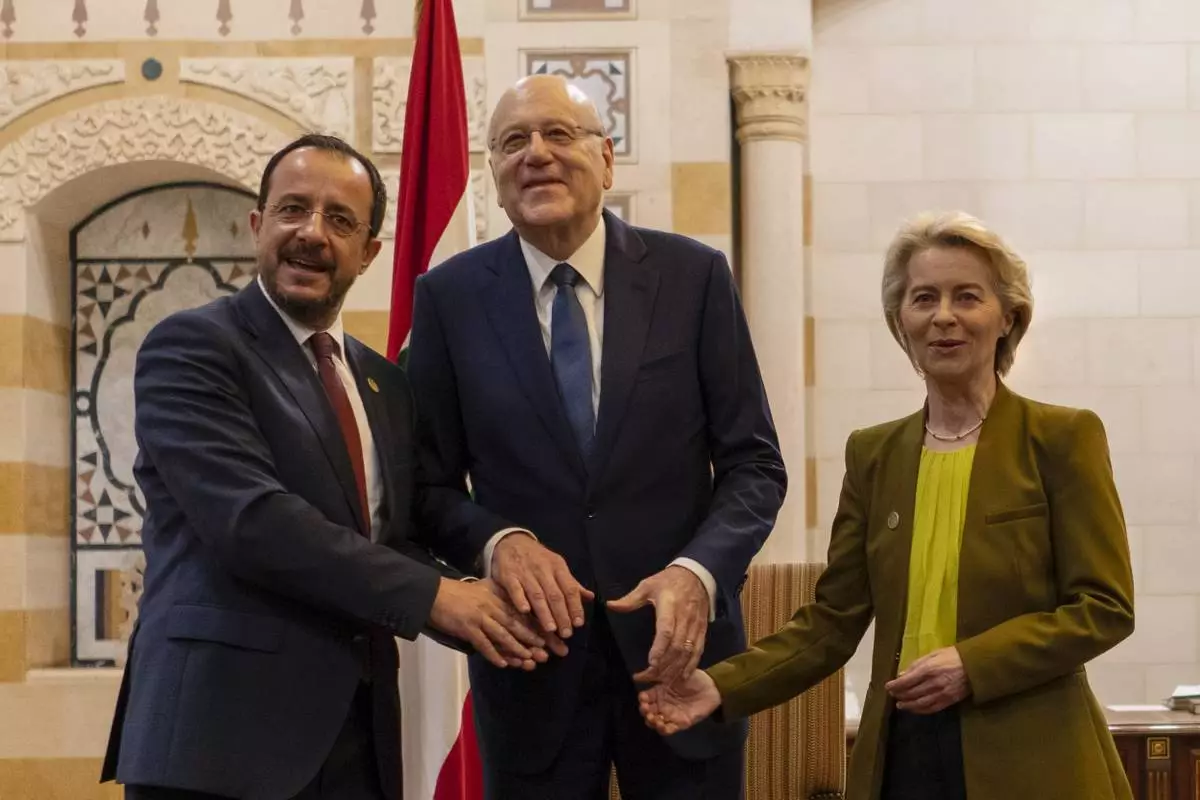
Lebanese caretaker Prime Minister Najib Mikati, center, Cyprus' President Nikos Christodoulides, left, and President of the European Commission Ursula von der Leyen pose for photograph at the government palace in Beirut, Lebanon, Thursday, May 2, 2024. (AP Photo/Hassan Ammar)
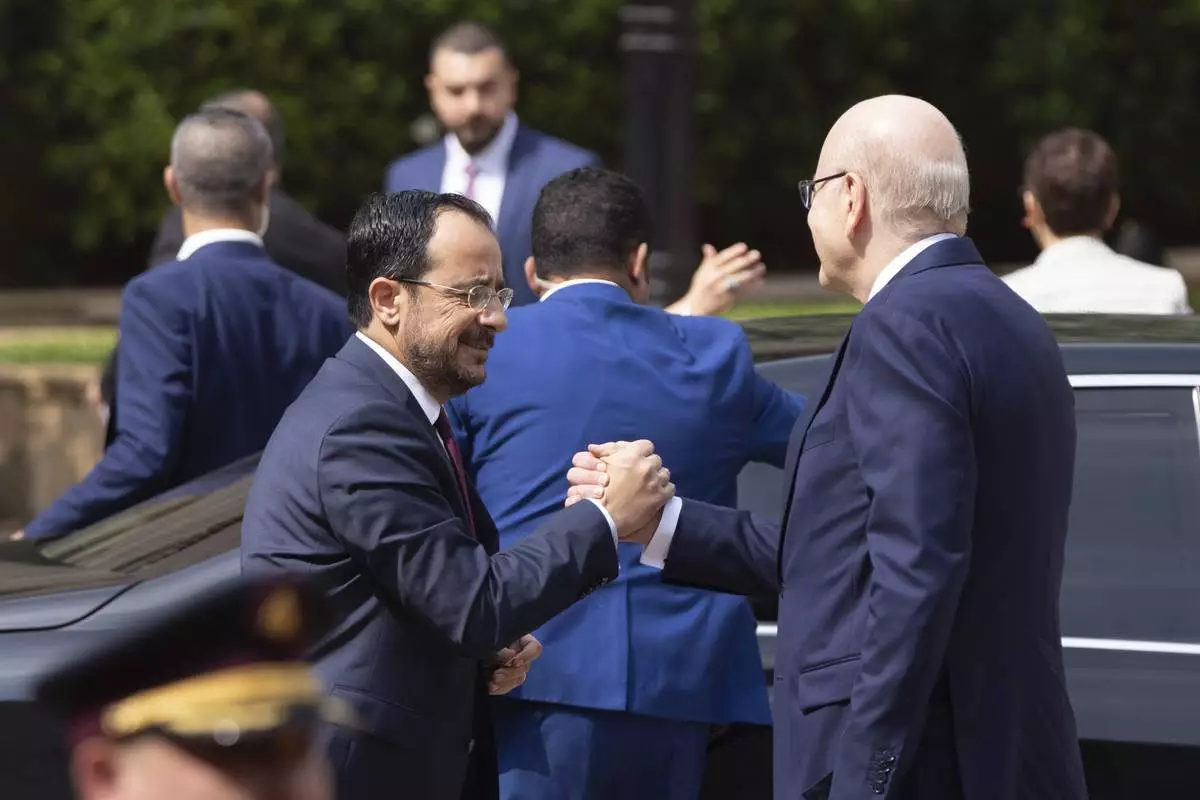
Lebanese caretaker Prime Minister Najib Mikati, right, welcomes Cyprus' president Nikos Christodoulides before their meeting at the government palace in Beirut, Lebanon, Thursday, May 2, 2024. (AP Photo/Hassan Ammar)

Cyprus' President Nikos Christodoulides, left, and President of the European Commission Ursula von der Leyen, center, review an honor guard upon their arrival to meet with the Lebanese Speaker Nabih Berri, in Beirut, Thursday, May 2, 2024. (AP Photo/Hussein Malla)

Lebanese caretaker Prime Minister Najib Mikati, center, speaks during his meeting with Cyprus' President Nikos Christodoulides, left, and President of the European Commission Ursula von der Leyen at the government palace in Beirut, Lebanon, Thursday, May 2, 2024. (AP Photo/Hassan Ammar)
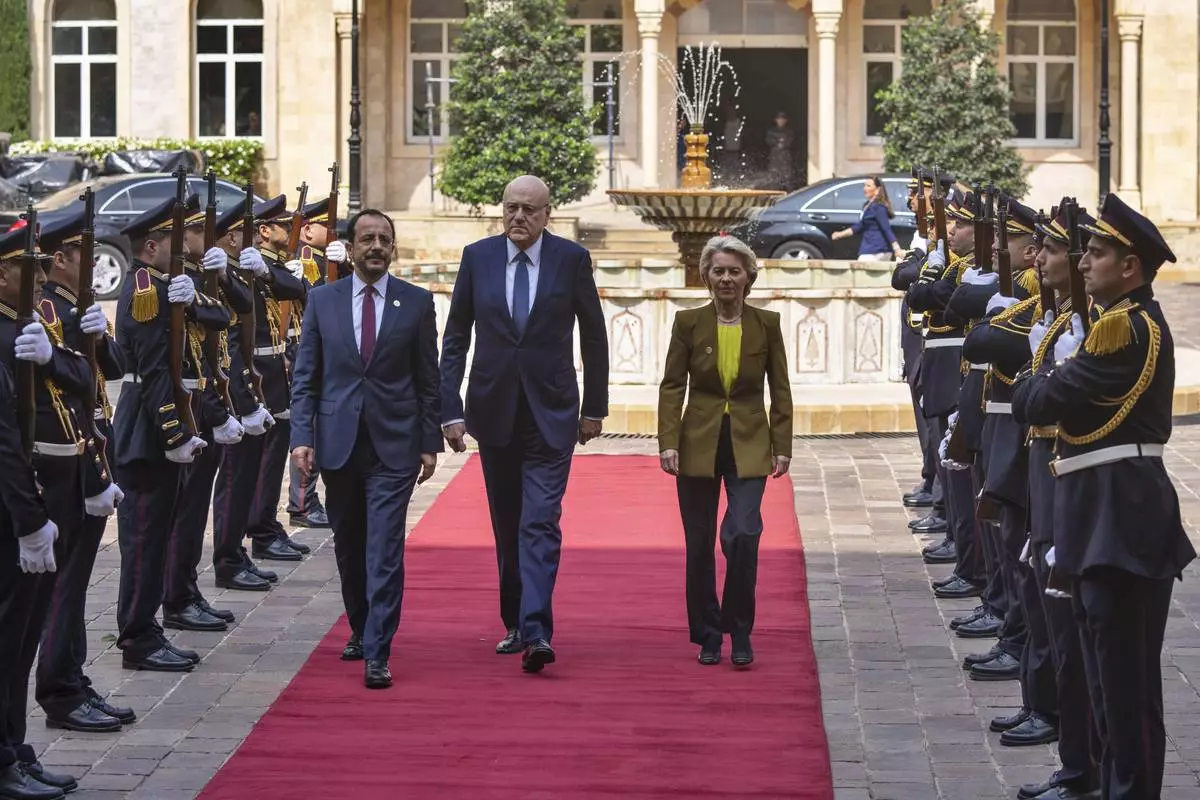
Lebanese caretaker Prime Minister Najib Mikati, center, welcomes Cyprus' President Nikos Christodoulides, left, and President of the European Commission Ursula von der Leyen at the government palace in Beirut, Lebanon, Thursday, May 2, 2024. (AP Photo/Hassan Ammar)












